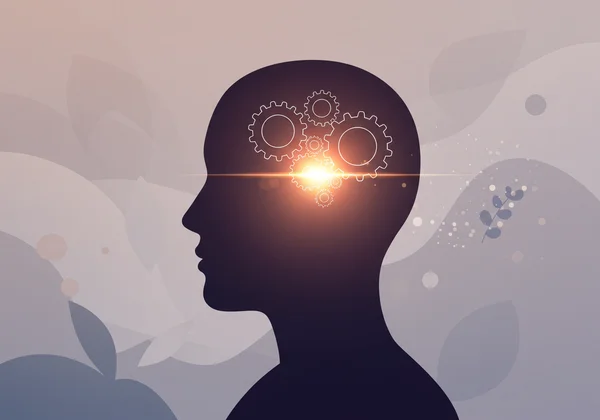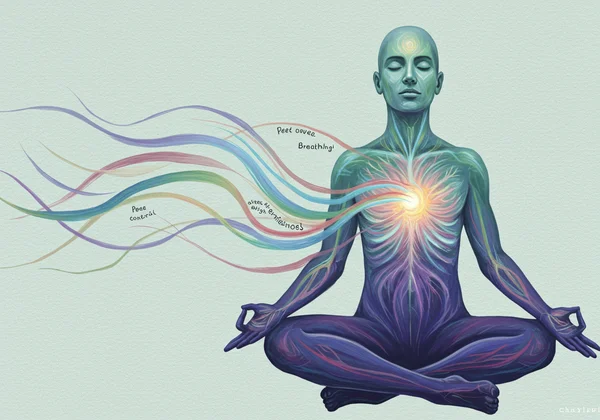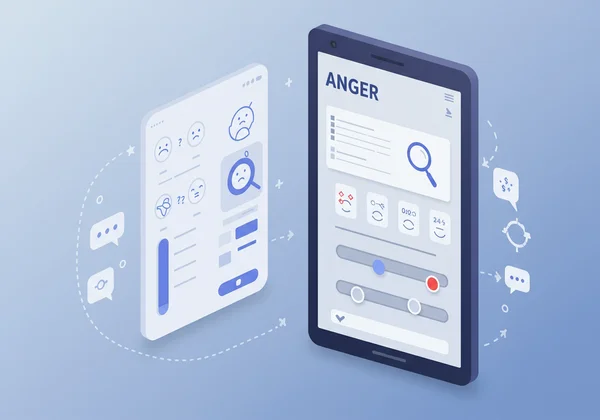Anger Management: Practical Control & Test Strategies
August 10, 2025 | By Landon Brooks
Are you tired of feeling like your anger is in the driver's seat? One moment you're calm, and the next, you're overwhelmed by a wave of frustration that feels impossible to manage. This experience is more common than you think, but you don't have to let it control your life. This guide is here to provide you with practical anger management strategies and tools for lasting change. Why am I so angry? If you find yourself asking this question, you've already taken the most important step: seeking understanding.
The journey to mastering your emotions begins with self-awareness. It involves looking inward to understand what fuels your anger and learning techniques to respond constructively. To get a personalized baseline of your unique emotional patterns, a structured assessment can provide invaluable clarity. You can start your journey of self-discovery today with a free online anger test.

Understanding What Fuels Your Anger
Before you can effectively manage anger, you must first understand its roots. Anger is often a secondary emotion—a response to underlying feelings like fear, hurt, or frustration. By exploring what's happening beneath the surface, you gain the power to address the real issue instead of just reacting to the symptom. This self-exploration is the foundation of effective emotional regulation.
The Different Types of Anger You Might Experience
Not all anger looks the same. Recognizing the specific forms it takes in your life is crucial for finding the right management strategy. Some common types of anger include:
- Explosive Anger: This is the classic outburst—shouting, slamming doors, or aggressive behavior that is intense but often short-lived.
- Chronic Anger: A long-term, simmering resentment that can affect your overall outlook on life and impact your health.
- Passive-Aggressive Anger: This is indirect anger, expressed through sarcasm, silent treatment, or subtle sabotage instead of direct confrontation.
- Overwhelmed Anger: This occurs when you feel your life's circumstances and stressors are too much to handle, leading to an outburst born from helplessness.
Identifying which type you relate to most can help you tailor the techniques you use. Understanding your patterns is the first step toward changing them, and an anger assessment test can help pinpoint these tendencies.
Identifying Your Personal Anger Triggers
Your personal anger triggers are the specific situations, people, or thoughts that set off your angry response. These are unique to you and are shaped by your past experiences, values, and current stressors. Common triggers include feeling disrespected, facing injustice, dealing with financial pressure, or experiencing relationship conflicts.
Take a moment to reflect on the last few times you felt angry. What was happening? Who were you with? What were you thinking about? Keeping a simple journal for a week can reveal surprising patterns. Once you know your triggers, you can either work to avoid them or, more powerfully, prepare a healthier response for when they inevitably arise.
Immediate Anger Management Techniques for Calm
When you feel anger rising, you need strategies that work in the moment. The goal of these anger management techniques is not to suppress the emotion but to create enough space to choose your reaction wisely. This prevents immediate escalation and gives your rational mind a chance to catch up.
Breathing Exercises to De-escalate Anger
When you get angry, your body enters a "fight or flight" state. Your heart rate increases and your breathing becomes shallow. Intentional breathing exercises can reverse this process by activating your body's relaxation response.
Try this simple technique:
- Inhale slowly through your nose for a count of four.
- Hold your breath for a count of four.
- Exhale slowly through your mouth for a count of six.
- Repeat this cycle 5-10 times.
This simple act can ground you in the present moment and significantly reduce the intensity of your anger.

Mindful Pauses: Creating Space Before Reacting
The space between a trigger and your reaction is where your power lies. A mindful pause is a crucial anger coping skill that helps you access that power. Instead of reacting instantly, consciously stop for a few seconds. Use this time to notice the physical sensations of anger in your body without judgment. This brief interruption can be enough to break the cycle of automatic, destructive reactions and allow you to choose a more thoughtful response.
Shifting Your Perspective: Cognitive Reframing
The stories we tell ourselves about a situation directly influence our emotional response. Cognitive reframing is the practice of challenging and changing unhelpful, anger-inducing thoughts. For instance, if someone cuts you off in traffic, your initial thought might be, "That person is a total jerk who did that on purpose!"
Cognitive reframamessing involves asking yourself: "Is there another way to see this?" Perhaps the driver was distracted, rushing to an emergency, or simply made a mistake. This doesn't excuse their behavior, but it removes the personal attack, which deflates the anger. You can learn more about your thinking patterns with a multidimensional anger test.
Long-Term Strategies for Lasting Anger Control
While in-the-moment techniques are essential, lasting anger control requires building resilient emotional habits over time. These long-term strategies focus on improving your overall emotional health, making you less susceptible to anger in the first place.
Developing Healthy Communication Skills
Much of our anger, especially in relationships, stems from poor communication. Learning to express your needs and feelings assertively—not aggressively—is a game-changer. Practice using "I" statements to own your feelings without blaming others. For example, instead of saying, "You never listen to me," try, "I feel hurt and ignored when I'm speaking and don't feel heard." This approach fosters dialogue instead of arguments.
Building Emotional Intelligence & Self-Awareness
Emotional intelligence is the ability to recognize, understand, and manage your own emotions, as well as recognize and influence the emotions of others. It involves being aware of how your feelings drive your behavior and seeing how they impact others. Regularly checking in with yourself and naming your emotions builds this crucial skill. The deeper your self-awareness, the easier it becomes to manage difficult emotions like anger.

Lifestyle Adjustments for Emotional Balance
Your physical health is directly linked to your emotional balance. Chronic stress, poor sleep, and a lack of physical activity can shorten your fuse and make you more prone to anger. Prioritizing these areas can have a profound impact:
- Consistent Sleep: Aim for 7-9 hours of quality sleep per night.
- Regular Exercise: Physical activity is a powerful way to release tension and improve mood.
- Stress Management: Incorporate activities like meditation, yoga, or hobbies that help you relax.
When to Seek Further Help & Support
Learning to manage anger is a journey, and sometimes, you need a clearer map. Understanding when your anger has become a significant problem is key to getting the right support and taking effective action.
Recognizing Signs of Unhealthy Anger Patterns
How do you know if you have anger problems? Look for unhealthy anger patterns that consistently disrupt your life. Key signs include:
- Frequent, intense arguments with family, friends, or coworkers.
- Physical aggression (e.g., hitting walls, breaking objects).
- Feeling angry a lot of the time, even over minor things.
- Your anger has led to legal or professional trouble.
- Loved ones have expressed fear or concern about your temper.
If these signs resonate, it's a strong indication that it's time to take proactive steps.
How a Scientifically-Backed Anger Test Helps You Understand
If you're unsure where to begin, a scientifically-backed anger test can serve as an excellent starting point. It's not a diagnosis, but rather a tool for profound self-reflection. The free anger test on our platform is designed based on psychological principles to help you explore multiple dimensions of your anger, including its frequency, intensity, triggers, and how you express it.
Receiving an objective summary of your tendencies provides a clear, personalized baseline. It transforms a vague feeling of "I'm always angry" into specific, actionable insights like, "My anger is most often triggered by feelings of injustice at work, and I tend to express it passively." This knowledge empowers you to apply the right strategies where they matter most. Take the test today to gain this clarity.

Empower Your Life: Taking Charge of Your Anger
Managing anger is not about eliminating it; it's about transforming your relationship with it. By understanding your triggers, practicing immediate coping skills, and building long-term emotional resilience, you can take charge of your reactions and, by extension, your life. This journey empowers you to build healthier relationships, reduce stress, and live with greater peace and purpose.
Your path to better emotional health starts with a single step. Are you ready to take it? Visit AngerTest.org to take the free, confidential anger test and gain the personalized insights you need to move forward.
Frequently Asked Questions About Anger Control & Assessment
Do I have anger issues if I feel angry often?
Feeling angry often doesn't automatically mean you have an "anger issue," as anger is a normal human emotion. The key question is whether your anger is negatively impacting your life, health, or relationships. If your anger feels uncontrollable, occurs frequently over minor issues, or leads to destructive behavior, it may be beneficial to explore management techniques and consider taking an anger issues test for more insight.
How can an online anger test truly help me?
An online anger test acts as a mirror, reflecting your emotional patterns in a structured way. It can help you move beyond general feelings of frustration by identifying specific triggers, measuring the intensity of your responses, and highlighting how you tend to express anger. This objective data is the first step toward self-awareness and creating a targeted plan for improvement.
Is it possible to completely get rid of anger?
No, and that shouldn't be the goal. Anger is a natural, and sometimes helpful, emotion that can signal injustice or threats. The goal of anger management is not to eliminate anger but to learn how to recognize it, understand its message, and express it in healthy, constructive ways that do not harm yourself or others.
What are the main signs I need anger management?
The main signs include frequent arguments that damage relationships, feeling constantly irritated or resentful, physical aggression (toward people or property), getting into trouble at work or with the law due to your temper, and loved ones expressing concern. If your anger feels out of control and is causing negative consequences, anger management strategies can be highly beneficial.
Can an anger test diagnose a condition?
No. It is critical to understand that an online tool like this one is for self-exploration and educational purposes only. It is not a substitute for professional medical advice or a clinical diagnosis from a qualified psychologist, therapist, or physician. If you are concerned about your mental health, please consult a healthcare professional. A test can be a great first step to understand your anger before speaking with an expert.